Democratic freedoms have declined under China’s new president, Xi Jinping, according to a recent report by Freedom House, a United States-based human rights and democracy watchdog. Tibetans and other minorities have been some of the worst affected by the changes.
“There is a clear change in how Xi Jinping is managing the censorship and security apparatus” Freedom House found, with the Chinese suffering “more restrictions” on the content of electronic communications since Xi’s rise to presidency. Greater freedom for Tibet, XinJiang and Taiwan are among topics routinely censored by Chinese authorities, the report adds, along with any criticism of the Communist Party leadership.
The study notes that, since the end of the Chinese labour camp system in 2013, use of “black jails”, or unofficial detention centres, has increased, leaving many detainees imprisoned without legal protection or oversight.
Party officials join religious minorities as some of those worst affected by the crackdown, the report continues, leading to a growing climate of fear and mistrust within the administration.
The report’s author, Sarah Cook, suggests that the new measures may “damage…regime legitimacy” at a time when the public is already becoming more openly critical of the government. “Official documents reflect a perceived lack of control and depleted ability to influence public opinion, to the point that it is seen as an existential threat to the regime,” she says.
The growing threat of economic slow-down may further undermine public support for the administration, Cook adds.

A sign used at an arts exhibition in Beijing in 2009 which reads ‘Caution Democracy’
Photo: AFP/Getty Images
However, despite increasingly heavy-handed tactics, many continue to defy government repression. “For persecuted religious and ethnic groups, the risks of even quiet resistance are significant given the harsh repression they face. Yet such resistance is widespread. Large numbers of Tibetans continue to keep an image of the Dalai Lama in their possession despite the threat of punishment and “patriotic education” campaigns that urge them to denounce their revered spiritual leader,” the report said.
The study, entitled “The Politburo’s Predicament”, draws on internal party records and testimony from 30 experts on China’s human rights crisis.





 Print
Print Email
Email